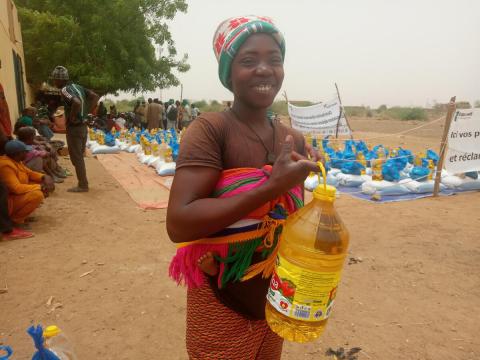How a food assistance programme helped reunite a family

In the past few years, the central and northern regions of Mali have been marked by deep insecurity, resulting in the massive displacement of people and significant destruction of livelihoods. Koro District is among the most affected areas. As a result, its local population, in particular women and children, have lost hope for a better future. Apart from the destruction, the conflict in this part of the world has also caused the separation of many families.
Habiba’s family was attacked.
“I used to live in a village not far from Burkina Faso—one of Mali’s neighbouring countries,” she narrates. “One early morning, a group of armed men attacked my village and took everything they could. During the incident, I was alone with the children. My husband was visiting some friends in a close-by village called Yehi. Unfortunately, I did not have a way to let him know what was happening with us.”
After the attack, the young mother struggled to look after her children alone, because she was forced to flee her village without knowing her husband’s whereabouts. Habiba struggled to feed her children, and as a result, decided to leave the village to seek refuge and a job in Koro town. However, as she recalls, the journey was a nightmare.
“It was difficult for us to reach our destination because the armed men occupied the main road,” she says. “As such, I had to transit through Burkina Faso where I spent three days with my three children at Solé Village and then later took a bus to Koro town. “Meanwhile, when my husband got back in the village, our neighbours told him that we had fled.”
In despair, Habiba's husband Yacouba travelled from village to village to find any information that could have helped him find his loved ones. Regrettably, he was unsuccessful.
The displaced mother recalls that before her village was attacked, she supported her family with what she earned from her small business. Given her state of vulnerability after the forced displacement, the 25-year-old mother of five was among people who benefited from the food distribution programme run by World Vision’s emergency response in Koro.
“I left my village empty-handed”, continues Habiba. “As a result, at my arrival in Koro, I could not feed the children.” With slim chances of returning to her village and without hope of ever seeing her husband again, the brave mother began collecting gravel and selling it to house constructors. In addition, she also earned money by washing clothes. The activities allowed her to survive, but did not present a durable solution for her family, as it could not allow her to earn sufficient income to guarantee the children’s need for adequate and sufficient food.
On the other hand, the food assistance and non-food items (water purification products, cooking utensils, beds, and mosquito nets) that she received at the distribution allowed her to feed her children for a period of three months and apart from the aid received, Habiba was able to be reunited with her husband.
“For me, this food distribution was not only an aid, because thanks to this, my husband was able to finally find us,” she says.
After many months of unsuccessful searching, Yacouba, was able to find his family through friends that also received food at the distribution, and quickly joined them. The reunion was a great relief for Yacouba.
“I was so worried about my family, I had prayed for their safety”, he says. “Thus, I was delighted to be reunited with Habiba and the children. Today, we live in a house that a host family led us [to], and my children are food secured.” The happy father happily shares that his wife recently gave birth to twins.
“I am grateful for the support provided by World Vision, because it kept my children alive”, he says. “I wish World Vision could continue to support my family, by helping me to send our four-year-old child to school next year. My greatest desire is for the conflict to end, so that we can return to the village and live peacefully.”
Unfortunately, as the conflict in central and northern regions of Mali continues, families like Habiba’s must continue to rely on emergency response programmes to provide lifesaving support.
So far, World Vision's emergency response programme has provided food assistance and helped to prevent child malnutrition among displaced families in Koro by reaching 1,460 children and 1,190 adults with food.
---
By Andre Yebedie, World Vision Cluster Programme Manager at Koro